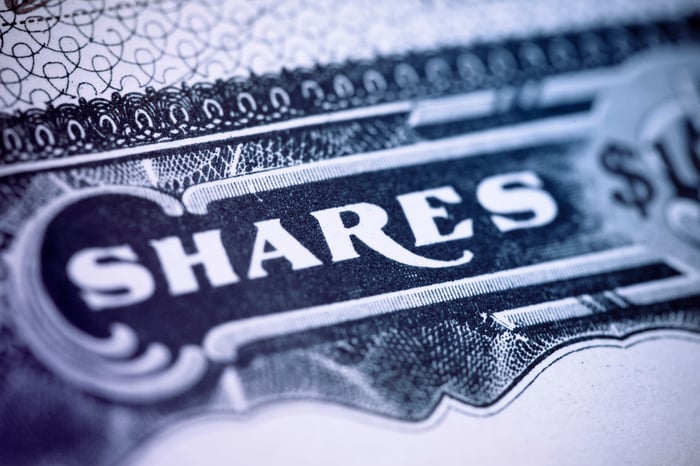One of Wall Street's few certainties is that investors will always seek out the proverbial light at the end of the tunnel, no matter how volatile the major indexes are. For the past two years, this bright light for the investing community has been companies enacting stock splits.
A stock split is an event that allows a publicly traded company to alter both its share price and share count without having any impact on its market cap or operations. It's a purely cosmetic change designed to either make shares more nominally affordable for everyday investors (i.e., a forward stock split) or to increase a company's share price to maintain a listing on a major stock exchange (a reverse stock split).

Image source: Getty Images.
Most investors gravitate to companies enacting forward stock splits. That's because these are businesses that have handily out-innovated, out-executed, and all-around outperformed their competition. Since July 2021, eight top-tier companies have conducted stock splits.
The outperformance of stock-split stocks isn't lost on prominent billionaire investors. Based on Form 13F filings that detail the buying and selling activity of institutional investors during the first quarter, billionaires have been piling into what may very well be the next group of stock-split stocks.
Broadcom
The first potential stock-split stock that has the full attention of one billionaire investor is semiconductor solutions provider Broadcom (AVGO 3.84%). A single share of Broadcom will set investors back nearly $847.
The billionaire money manager who's been piling into Broadcom is none other than Jeff Yass at Susquehanna International. Yass' fund scooped up 107,026 shares of Broadcom during the March-ended quarter, which brought its total position to 470,500 shares (currently worth about $398.4 million, assuming a static share count).
Although there's a long list of catalysts fueling Broadcom's upside, Yass and his team are likely honed in on three sustained growth drivers.
To start with, Broadcom generates a significant percentage of its revenue by selling next-generation wireless chips and solutions used in smartphones. The ongoing rollout of 5G infrastructure by wireless providers after roughly 10 years of 4G download speeds should be the impetus that encourages consumers and businesses to upgrade their devices. This device-replacement cycle will take years, which provides a lengthy growth runway for Broadcom's wireless chips.
Businesses shifting more of their data online and into the cloud is the second significant growth driver. Broadcom supplies an array of Ethernet switches and access chips that are used in enterprise data centers.
And third, Broadcom is viewed as a serious player in the artificial intelligence (AI) arena. In addition to unveiling its Jericho3-AI chip in April, which can connect up to 32,000 graphics processing units and cement the company's role as a key player in enterprise data centers, Broadcom is making waves with its automotive solutions. This includes advanced driving assistance systems, such as Hydra, which "provides an end-to-end Ethernet connection for video distribution within the vehicle," per the company.
Costco Wholesale
A second potential future stock-split stock catching the eye of at least one Wall Street billionaire is warehouse club Costco Wholesale (COST 1.01%). Costco closed out last week just north of $525 per share and hasn't split its stock in more than 23 years.
The billionaire investor who can't seem to get enough of Costco is Jim Simons of Renaissance Technologies. Simons' fund gobbled up 93,809 shares of Costco during the first quarter, which brought its total stake to 232,792 shares (worth $122.2 million, as of last weekend).
The Costco growth story is all about competitive advantages. It starts with the company's deep pockets, which allow it to buy most of its products in bulk.
The benefit of buying goods in bulk is that it typically results in a lower per-unit cost. Costco then passes these savings to its members in the form of a lower price for certain grocery items. Being able to undercut major grocers and mom-and-pop shops is a key strategy Costco uses to gain new members and retain existing ones.
Something else to consider is that Costco is about more than just groceries. While lower-cost food and beverage items are what tend to drive shoppers into its stores, selling non-discretionary goods, such as clothing, electronics, jewelry, and so on, is where the company can really begin generating a profit.
But at the heart of it all is Costco's membership program. The annual fees Costco collects from its members are high margin and provide a sizable impact on its bottom line. These fees also allow Costco to be aggressive with its pricing strategy.
To add, consumers are more likely to choose Costco over other stores if they're paying for an annual membership. The exclusivity of being a member -- and paying money to be a member -- means consumers are going to head to Costco rather than their local non-membership store.

Image source: Getty Images.
Netflix
The third possible stock-split stock of the future that billionaires are piling into is streaming services provider Netflix (NFLX -0.63%). The company's shares closed out this past week a hair above $438. Netflix hasn't conducted a stock split since July 2015.
Three billionaires have been actively piling into Netflix, based on 13F filings. Philippe Laffont of Coatue Management oversaw the purchase of 1,392,228 shares in the March-ended quarter, bringing Coatue's stake to 2,727,906 shares. John Overdeck and David Siegel of Two Sigma Investments opened a 711,667-share position in Q1. Coatue's stake is currently worth about $1.2 billion, while Two Sigma's clocks in at $311.8 million.
For most investors, the clear lure of Netflix is its first-mover advantage in the streaming arena. Netflix ended March with 232.5 million global streaming paid memberships, which makes it the big kahuna in terms of streaming share in the U.S. and international markets.
Perhaps more importantly, Netflix is the leader when it comes to streaming profits. While legacy media players are ramping up their content libraries in the streaming space, Netflix is the only major streaming service that's consistently profitable. In fact, Netflix upped its full-year free cash flow forecast in 2023 to "at least $3.5 billion" from a prior forecast of "at least $3 billion."
There's also plenty of subscriber momentum following Netflix's decision in November to roll out a lower-cost ad-supported streaming plan. In the six months since the company introduced an ad-supported tier, almost 5 million people have signed up.
However, the one knock with Netflix continues to be its valuation. Despite strong cash-flow generation during the first quarter, investors are paying nearly 40 times Wall Street's consensus cash flow for 2023. That's absurdly expensive for a media stock and indicative of how much money Netflix has to reinvest in its business to maintain its leading share of the streaming market.





